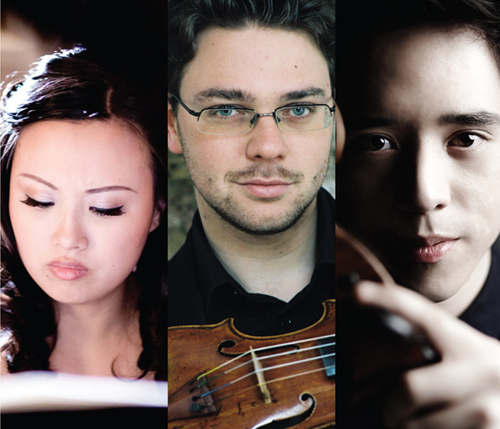Korngold rarity proves the highlight of Sitkovetsky Trio’s debut at Wolf Trap

The Sitkovetsky Trio performed Sunday at the Barns at Wolf Trap.
The Sitkovetsky Trio made a respectable debut Sunday afternoon in the Barns at Wolf Trap. Continuing the theme of artistic director Wu Han for the venue’s chamber music series this season, the group focused on Viennese music. The trio, joined by violinist Sean Lee, performed two standards by Beethoven and Schubert, going farther afield for an unusual piece by Korngold.
Violinist Alexander Sitkovetsky and pianist Wu Qian, who happen to be husband and wife, anchor the trio. Over the years they have worked with different cellists, but for about two years they have forged a new partnership with cellist Isang Enders. In a question and answer session before the second half, Enders acknowledged that the role of musical third wheel could be difficult but that so far it suits him fine.
The ensemble’s sound on Beethoven’s Piano Trio No. 5 certainly bore witness to the success of the collaboration so far. Enders shone brightest of the two string players, with mellifluous tone and sure intonation on the cello part. Wu Qian kept the racing keyboard figures fleet in the first movement, also giving a spine-tingling softness to the eerie tremolos of the second movement, which gave the piece its nickname, “Ghost.”
More brilliant arpeggios, scales, and octaves flowed from the group’s pianist in the finale, matched by a bravura tone from Enders. On the violin part Sitkovetsky kept pace with both of his colleagues in the Beethoven, but his tone turned a bit strident at times under stress with some wayward intonation.
Lee, an American violinist with a rising profile after receiving an Avery Fisher Career Grant in 2016, excelled in Schubert’s Fantasy in C Major. His pure, floating sound on the sweet melodies of the first movement glowed, matched by the transparent touch of Wu Qian in the tremolos that tied the piece thematically to the Beethoven. Lee’s tempo choices were conservative, but most of the technical difficulties were secure in this most challenging piece.
If anything, the piano part of this piece is even more daunting than the violin part. Wu Qian tamed it all with self-assurance, showing finesse and grace in the many trills, runs, and other details, achieved with enough lightness not to cover her partner.
Korngold composed his Suite for Two Violins, Cello, and Piano, Left Hand, in 1930, shortly before he fled Europe to take refuge in America. The Suite is one of several pieces by various composers commissioned for pianist Paul Wittgenstein, who lost his right arm in World War I, and is a fine example of Korngold’s late romantic style—one that would become celebrated and instantly recognizable in the Warner Brothers film scores Korngold would soon be writing in Hollywood.
The piece opened with a dramatic monologue for the piano, “Präludium und Fuge,” in which Wu Qian produced more power with just one hand than she had displayed with both in the more retiring Schubert. The strings, generally used by Korngold as a unit, ornamented this soliloquy in unison. The long, curious subject was introduced by the cello, spun out fugally for a time before returning to the style of the opening section. Sitkovetsky and Lee made a strong pairing on first and second violin, respectively.
The work is a pleasing series of such character pieces. A waltz began in a smoky haze, with mutes on the strings, and whirled away. The more extended “Groteske” sounded like carnaval jokes and pranks, surrounding a more lyrical middle section. The boldly romantic “Lied” sets one of Korngold’s own art songs from the same period, as unabashedly lyrical as a sentimental Hollywood love story. The musicians gave the earnest “Rondo-Finale” an air of folk-music sincerity and epic sweep.
The Calidore String Quartet and pianist Juho Pohjonen perform music by Haydn, Mozart, and Beethoven 3 p.m. April 7. wolftrap.org; 703-255-1900




Posted Mar 25, 2019 at 4:45 pm by Brendan Carroll
While I am glad that you apparently enjoyed Korngold’s Suite, the work has nothing whatsoever to do with Hollywood or film music, yet like so many critics, you cannot refrain from harping on about this composer’s enforced exile there and his influential work for film, almost as if you feel the need to qualify his skill as a composer. Critics love denigrating his music in this way, as though he was always only thinking in cinematic terms, which he most certainly was not.
Give it a rest, please and concentrate on the music for what it is – an intense and original reflection of fin-de-siecle Vienna that is full of bittersweet nostalgia for the dying embers of the Habsburg Empire while at the same time replete with the expressive, piquant and highy original harmony of its time.